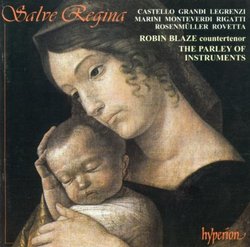| All Artists: Giovanni Rovetta, Alessandro Grandi, Biagio Marini, Francesco Maria Marini, Dario Castello, Claudio Monteverdi, Giovanni Antonio Rigatti, Giovanni Legrenzi, Johann Rosenmuller, Robin Blaze Title: Salve Regina, Sacred Music by Monteverdi and His Venetian Followers Members Wishing: 0 Total Copies: 0 Label: Hyperion UK Release Date: 4/10/2001 Album Type: Import Genres: Pop, Classical Styles: Vocal Pop, Opera & Classical Vocal, Chamber Music, Historical Periods, Baroque (c.1600-1750), Classical (c.1770-1830), Instruments, Strings Number of Discs: 1 SwapaCD Credits: 1 UPC: 034571172255 |
Search - Giovanni Rovetta, Alessandro Grandi, Biagio Marini :: Salve Regina, Sacred Music by Monteverdi and His Venetian Followers
 | Giovanni Rovetta, Alessandro Grandi, Biagio Marini Salve Regina, Sacred Music by Monteverdi and His Venetian Followers Genres: Pop, Classical
|
Larger Image |
CD Details |
CD ReviewsIntimate Italian renaissance songs tertius3 | MI United States | 10/21/2001 (4 out of 5 stars) "This is a fine album of Italian Venetian Renaissance singing to string accompaniment. Most of these pieces by diverse composers were apparently written in the decades following 1620, when Venetian music transitioned from the stentorian and brassy bi-choral music of the Gabrielis to the more virtuosic but intimate, small-scale, and string-based trio sonata with voice. The sacred texts and music--not from the mass--are mostly rather quiet but upbeat, set in contemporary secular opera rather than grand church styles, and thereby more expressive. Cut #2 is in fact a love song to Christ!, one of several texts with a tinge of sensuality. All the compositions were conceived for, and are performed here by, a solo voice and limited string accompaniment (plus two string sonatas as interludes). This produces a "small" and intimate sound, closely recorded to fill your room (much more realistically than a 19th century symphony would). Most of this music is rather somber and played at a slow to moderate tempo. Some are strophic songs while others are through-composed with greater attention to freely expressing the text, for example the extraordinarily intense "Cum invocarem..." by the neglected master G.A. Rigatti (who unfortunately died young). The final piece, by the German interloper, Rosenmüller, is of interest to hear not only for its outbreak of joyous propulsiveness but because he was a prime importer of Italian styles into Germany, eventually leading to Bach. The soloist is Robin Blaze, a wonderfully robust sounding countertenor (male alto) without breaks in his range nor a piping falsetto. The Parley of Instruments consists of six string players using small-voiced 17th-century-type instruments and led from what must be a small organ by Peter Holman (leader, music editor, and crafter of the chronological and expressive order of the pieces recorded here). Altogether a very full and fine performance that revives very rarely heard but lovely works." A voice teacher and early music fan George Peabody | Planet Earth | 11/25/2006 (5 out of 5 stars) "ON THIS DISC ROBIN BLAZE LIGHTS A FIRE!
Venetian Sacred Music changed drastically in the 1620s from the polychoral style of Gabrielli to a new and different idiom. Instead of extravagant writing for large divided choirs, the emphasis was on a few solo voices singing music that required great skill and virtuosity. In addition, somewhat in the style of Monteverdi the music became more intimate, and reflected the influence of secular music. This recording concentrates on the music for the countertenor voice, since much of it was written originally to be sung by falsettists and/or castrati. Alessandro Grandi seems to have invented the motet for solo voice with violins, and there are 2 on this disc: 'Amo Christum' and 'Ave Maria Stella'.Very little is known about Francesco Marini, but his fine setting of the hymn 'Jesu dulcis memoria' is notable for its Venetian flavour. The setting of 'Exultate Deo' is the only known vocal work of a Venetian wind player and important composer of Sonatas, Dario Costello. Monteverdi's 'Pianto della Madonna' is a strange and problematic work taken from his lost opera 'Arianna' and one cannot envision this as a religious work. Giovanni Rigatti and Giovanni Rovetta replaced Monteverdi at St. Marks after his death in 1643. Rigatti's setting of Psalm 4 "Cum invocarem" and the "Nunc dimittis" came from a collection of music for Compline, and they show that he was a master of the Monteverdi stye. In Rovetta's setting of 'Salve Regina' the instruments have a more modern role, accompanying the voice, as well as alternating with it. The 2 instrumental sonatas by Marini and Legrenzi exemplify the changes in the Italian sonata between the 1620's and 1650's. Legrenzi's charming Christmas motet "O Mirandum Mysterium" exemplifies clarity and sweetness and finally deeper things. Now comes my FAVORITE selection on the disc:'Ascendit Christus in altum' by Johann Rosenmuller. He takes the music a step forward; it consists of a joyful triple-time passage that encloses a brief recitative and a duple-time strophic aria. It is incredibly attractive. This, in my opinion, is Robin Blaze's BEST RECORDING!!!!!..His countertenor voice has more depth and emotion than I hear on his other recordings. His diction has always been flawless and his technical ability considerable. The Parley of Instruments led by Peter Holman is, as usual, excellent. A great disc for the lover of early music." |

 Track Listings (12) - Disc #1
Track Listings (12) - Disc #1